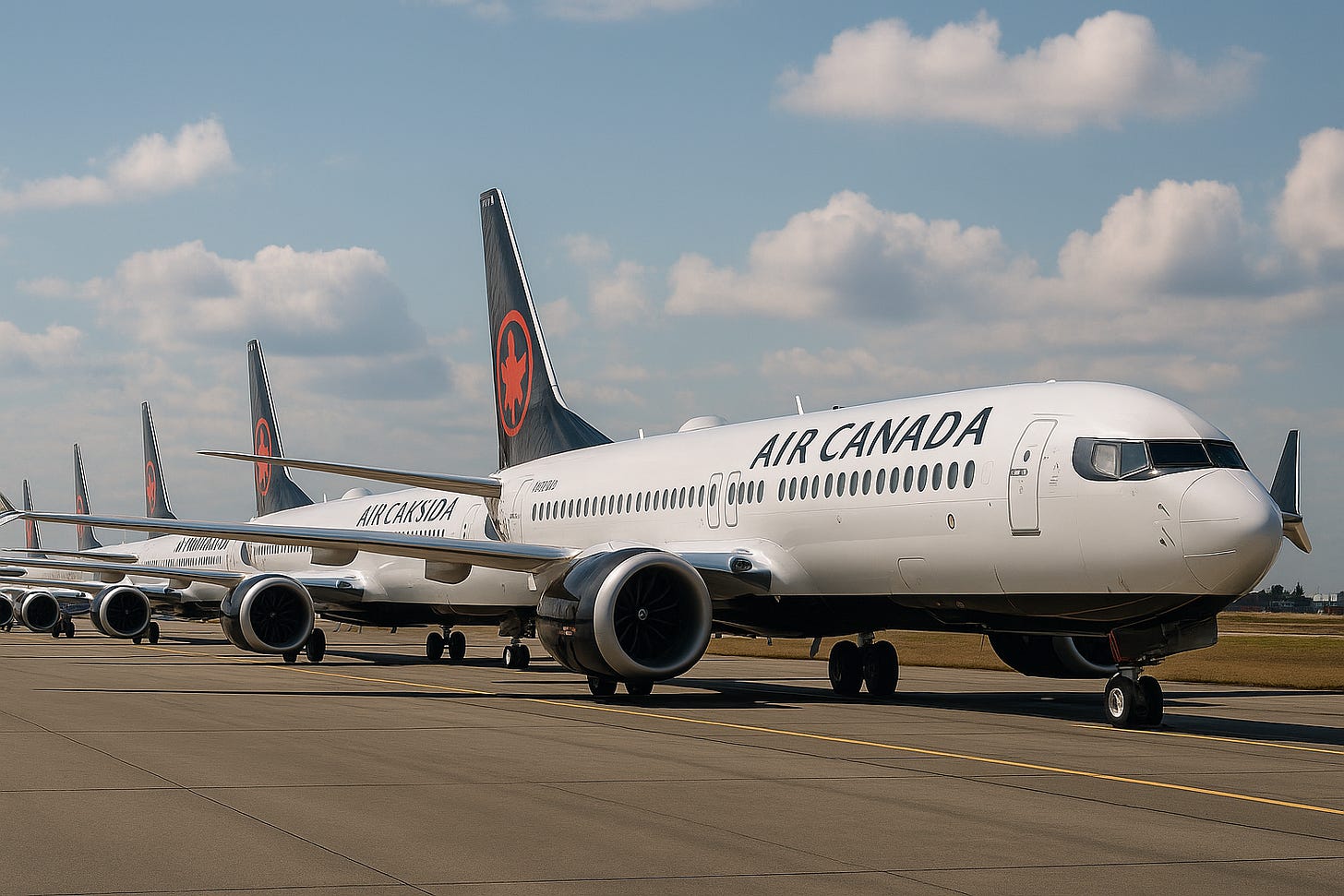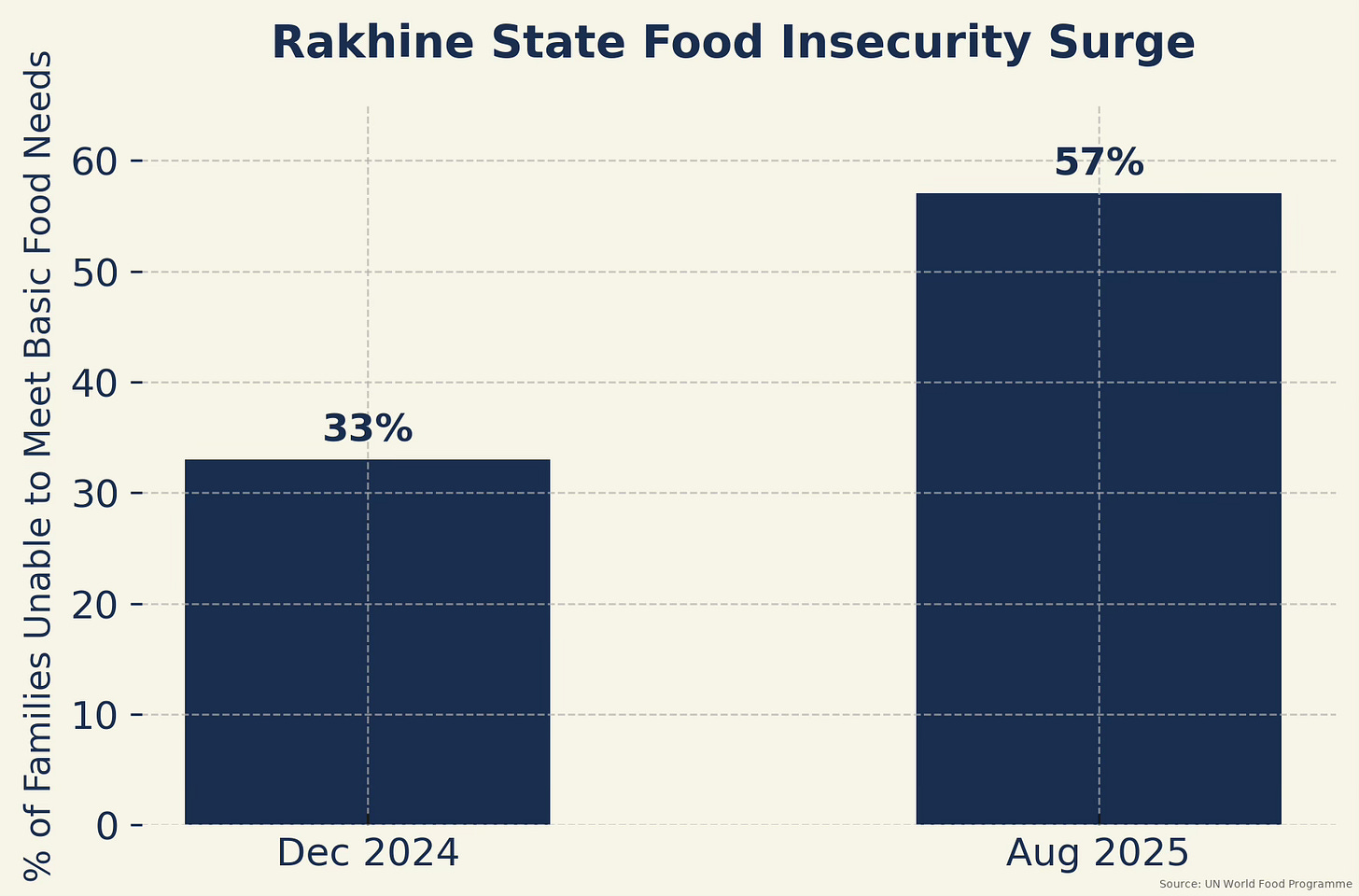10 Things Global News - 15 August 2025
The news from around the world
European Leaders Seek Role in Trump–Putin Talks
Putin Praises Trump Ahead of Alaska Summit
US Sends Forces to Target Latin Cartels
US Warns India of Higher Tariffs if Peace Talks Fail
Air Canada Faces Strike as Talks Stall
Newsom Pushes Special Vote on House Map
Geneva Plastics Treaty Talks Extended
HRW Says Israeli Strike on Prison a War Crime
Hunger Deepens in Myanmar’s Rakhine State
Southern Europe Continues to Battle Deadly Wildfires
European leaders voiced cautious optimism after a call with U.S. President Donald Trump ahead of his summit with Russian President Vladimir Putin in Alaska. Trump told the leaders his goal was to secure a ceasefire between Moscow and Kyiv and agreed that Ukrainian President Volodymyr Zelensky must be involved in territorial decisions and security guarantees. UK Prime Minister Keir Starmer and Zelensky met in London Thursday, emphasizing unity and urging Putin to prove his commitment to peace.
Despite Trump’s optimism, Moscow’s position remains unchanged, demanding Ukraine withdraw from four occupied regions and abandon NATO ambitions. Russian advances near Dobropillya have heightened concerns that the Alaska meeting could produce a deal favoring Moscow.
European leaders reiterated that Kyiv must be part of any settlement, while Ukraine warned that conceding territory could enable future invasions. Trump suggested a second summit could follow if progress is made.
Sources: BBC, LA Times
Russian President Vladimir Putin praised U.S. President Donald Trump’s “energetic and sincere” efforts to end the war in Ukraine, as the two prepared for a pivotal summit in Alaska on Friday.
Putin hinted the talks could also open the way for a nuclear arms control agreement. In Washington, Trump said there was a 25% chance the summit could fail but suggested a second meeting could follow, involving Ukrainian President Volodymyr Zelensky and possibly European leaders.
U.K. Prime Minister Keir Starmer hosted Zelensky in London Thursday, stressing that any ceasefire must protect Ukraine’s territorial integrity. European leaders voiced concerns the bilateral talks might sideline Kyiv and favor Moscow. Kremlin officials cautioned against expecting immediate breakthroughs, while Trump and Putin’s teams outlined plans for one-on-one discussions, delegation meetings, and a working breakfast. The summit will focus on Ukraine, trade, and security, with the press conference format yet undecided.
Sources: Associated Press, CNN
The United States has begun deploying air and naval forces to the southern Caribbean Sea to counter Latin American drug cartels designated as global terrorist organizations. The move follows a reported order from President Donald Trump directing the Pentagon to prepare military action options. Assets include P-8 surveillance aircraft, at least one warship, and an attack submarine, with operations expected to continue for months in international airspace and waters.
Cartels named in the U.S. designations include Mexico’s Sinaloa Cartel, Venezuela’s Tren de Aragua, and the Venezuelan Cartel de los Soles, which Washington alleges is led by President Nicolás Maduro and senior officials. The U.S. recently doubled its reward for Maduro’s arrest to $50 million. Officials say naval forces could serve for intelligence gathering or as platforms for targeted strikes. Maduro warned Washington against intervention, calling himself “a man of peace” but threatening consequences if attacked.
Sources: Latin Times, Reuters
US Treasury Secretary Scott Bessent has warned that Washington could raise secondary tariffs on India if Friday’s meeting between President Donald Trump and Russian President Vladimir Putin in Alaska fails to produce progress on ending the war in Ukraine.
The US has already imposed a 25% penalty on Indian imports for buying Russian oil and weapons, in addition to existing 25% tariffs. A new 50% tariff rate is scheduled to take effect on 27 August.
Bessent said sanctions or tariffs could rise further if Moscow resists a peace deal. He urged European nations to back US sanctions efforts. India’s purchases of discounted Russian crude have grown from 3% of imports in 2021 to as much as 40% in 2024, straining bilateral trade talks. Delhi argues it must secure affordable energy to protect its poorest citizens from high prices. Negotiations are due to resume in India on 25 August.
Sources: BBC, The Economic Times
Air Canada has begun cancelling flights ahead of a potential flight attendants’ strike set to start early Saturday, after negotiations with the Canadian Union of Public Employees (CUPE) failed to produce a deal.
The union, representing about 10,000 attendants, says the dispute centres on wages and unpaid “ground work” performed before boarding and after landing. CUPE is demanding full pay for those hours, while the airline has offered 50% of the hourly rate.
The carrier says it proposed a 38% total compensation increase over four years, with a 25% boost in the first year, but CUPE says it has not seen that offer. Air Canada has cancelled dozens of flights, mostly long-haul, with about 500 cancellations expected by Friday evening, affecting over 100,000 passengers. Federal Jobs Minister Patty Hajdu has urged both sides to reach an agreement, giving the union until Friday noon to respond to arbitration.
Sources: CBC, CNN
California Governor Gavin Newsom has launched a campaign for a November 4 special election to approve a new congressional map designed to favor Democrats if Republican-led states, notably Texas, move ahead with their own partisan redistricting. The proposal, called the Election Rigging Response Act, would suspend maps drawn by California’s independent redistricting commission for the 2026, 2028, and 2030 elections, returning to the commission in 2031.
Newsom says the move is needed to counter Republican efforts encouraged by President Donald Trump to shift U.S. House control. Supporters say the plan could make five districts more favorable to Democrats, potentially cutting the state’s nine-member Republican delegation by more than half.
Critics — including former Governor Arnold Schwarzenegger and original commission backers — call it hypocritical and undemocratic. The measure must first pass the Democratic-led Legislature by August 22 before going to voters.
Sources: LA Times, New York Times
UN negotiations in Geneva to create a legally binding plastics treaty have been extended by a day after 80 countries rejected the latest draft. Talks, originally set to end Thursday, will now continue August 15 as delegates remain sharply divided over production caps and chemical controls.
A coalition of about 100 “ambitious” nations criticised the text as a toothless waste management plan that omits mandatory production limits and fails to address toxic ingredients. Oil-producing members of the “Like-Minded Group,” including Saudi Arabia, opposed the scope, saying it crossed too many red lines.
Civil society groups warned of a “sell-out” to secure a weak deal, while some Pacific island states and the EU called the draft unacceptable. The stalled negotiations follow five earlier rounds over two and a half years without agreement, despite mounting concern over the health and environmental costs of global plastic waste.
Sources: The Guardian , Al Jazeera
Human Rights Watch has accused Israel of committing an “apparent war crime” in a June 23 airstrike on Tehran’s Evin Prison during its 12-day war with Iran. The strike, which hit entrances and other areas of the notorious detention facility during visiting hours, killed at least 80 people, including inmates, relatives, and staff, according to Iranian authorities.
The rights group said its investigation found no evidence of military targets in the complex, which holds over 1,500 prisoners and is presumed a civilian site under international law. HRW described the attack as “unlawfully indiscriminate” and said Israel gave no advance warning.
Following the strike, prisoners were transferred to other facilities; HRW alleges some were beaten or disappeared, including Swedish-Iranian doctor Ahmadreza Djalali. Iran’s government denies mistreatment claims. Both Israeli and Iranian authorities declined immediate comment on the report. The June conflict left about 1,100 dead in Iran and 28 in Israel.
Sources: PBS, L'Orient Today
In western Myanmar’s Rakhine State, residents are resorting to foraging for bamboo shoots as conflict, blockades, and international aid cuts fuel a sharp rise in hunger. The military’s blockade, aimed at an ethnic armed group, has choked supplies to the state’s 2.5 million people.
Humanitarian groups say the crisis has worsened after U.S.-led funding freezes, including cuts to the World Food Programme (WFP), which relied on the U.S. for nearly half its 2024 budget. WFP reports that 57% of families in central Rakhine cannot meet basic food needs, up from 33% in December, with conditions in conflict-hit northern areas “much worse.”
Residents describe soaring prices, scarce fertilizer, and unaffordable produce. Many communities have received only two aid deliveries in a year. Nearly half a million people remain displaced, with some fearing the situation will deteriorate further.
Sources: Straits Times, Japan Times
Firefighters in Greece, Spain, and Portugal worked to contain wildfires on Thursday as calmer winds allowed aircraft to target active fire zones. Much of southern Europe remains at high risk under hot, dry conditions. Authorities warned that extreme heat is set to persist.
In Spain, a third person died this week — a volunteer firefighter who sustained severe burns north of Madrid. Two others died earlier, including one man trying to save horses from a burning stable. Thousands have been evacuated, and 1,000 military personnel with 50 aerial units have been deployed.
In Greece, a major blaze near Patras has been contained after large-scale firefighting operations. A 19-year-old man has reportedly confessed to starting the fire, one of several arrests. The EU’s civil protection mechanism has been activated 16 times this season — matching all of 2024 — with aircraft and crews sent to multiple countries battling intense blazes.















